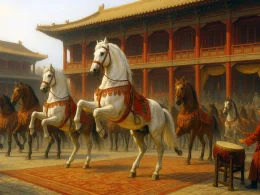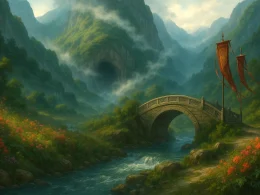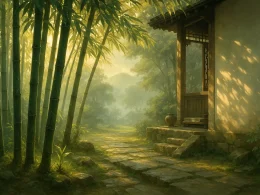The mason of Duanzhou has marvel-doing hands,
Whetting his knife to carve blue clouds, aloft he stands.
He grinds the stone in order to make an inkwell;
Violet flowers look dim like cold blood shed pell-mell.
Black flowers seem like spring at noon behind the screen;
The pine-soot ink steeped in water smells like musk keen.
Smooth, water-proof, flat and heavy, it stands steadfast;
Like autumn bright its color, rain or shine, will last.
Your brush will make no noise when on paper you write.
Could the inkstone of Confucius give such delight?
Original Poem
「杨生青花紫石砚歌」
李贺
端州石工巧如神,踏天磨刀割紫云。
傭刓抱水含满唇,暗洒苌弘冷血痕。
纱帷昼暖墨花春,轻沤漂沫松麝薰。
干腻薄重立脚匀,数寸光秋无日昏。
圆毫促点声静新:孔砚宽硕何足云!
Interpretation
This Tang dynasty poem by Li He passionately celebrates the exquisite craftsmanship of Duanzhou inkstones, praising the superlative skills of Duan stoneworkers. Through vivid metaphors and delicate brushstrokes, the poet depicts both the quarrying process and the refined qualities of purple inkstones with blue veining. Beyond showcasing the inkstone's unique charm, the work embodies the poet's distinctive aesthetic sensibility toward art and culture.
First Couplet: "端州石工巧如神,踏天磨刀割紫云。"
Duānzhōu shí gōng qiǎo rú shén, tà tiān mó dāo gē zǐ yún.
Duan's stoneworkers divine in art, Tread heavens to whet knives that purple clouds part.
The opening extols Duan craftsmen's godlike skill. The fantastical image of workers "treading heavens" to quarry stone - where water-reflected cliffs become celestial realms and tools slice through cloud-like rock - creates breathtaking romanticism.
Second Couplet: "傭刓抱水含满唇,暗洒苌弘冷血痕。"
Yòng wán bào shuǐ hán mǎn chún, àn sǎ Cháng Hóng lěng xuè hén.
Polished to hold water like lips full and fair, Veined with Chang Hong's frozen bloodstains rare.
This describes the inkstone's perfect carving and blue veins. "Polished" indicates meticulous shaping, while "holding water" praises its absorbency. The blue veins resemble the legendary minister Chang Hong's petrified blood (mythically said to turn green after death), lending tragic grandeur.
Third Couplet: "纱帷昼暖墨花春,轻沤漂沫松麝薰。"
Shā wéi zhòu nuǎn mò huā chūn, qīng ōu piāo mò sōng shè xūn.
Through gauze curtains, warm daylight streams, Where ink blossoms like spring in dreams - Floating froth exhales pine-soot musk, A perfumed dance as brushes brush.
The scene shifts to scholarly use. In a sunlit study, grinding ink creates "spring blossoms" in the inkpool, with floating bubbles releasing pine-soot and musk aromas - highlighting the inkstone's perfect texture for ink preparation.
Fourth Couplet: "干腻薄重立脚匀,数寸光秋无日昏。"
Gān nì báo zhòng lì jiǎo yún, shù cùn guāng qiū wú rì hūn.
Dry yet smooth, thin yet dense, Standing firm with balanced sense. Autumn-bright though inches small, No dimness ever flaws its pall.
This analyzes material qualities: non-porous yet fine texture ("dry yet smooth"), slender yet weighty. Its surface shines like flawless autumn skies, reflecting supreme quality.
Fifth Couplet: "圆毫促点声静新:孔砚宽硕何足云!"
Yuán háo cù diǎn shēng jìng xīn: Kǒng yàn kuān shuò hé zú yún!
Round brushes touch without a scratch - What's Confucius' clumsy slab to match?
The final comparison underscores Duan inkstone's superiority. Gentle on brush tips, it enables silent, fluid writing - while mocking the bulky, impractical inkstone traditionally associated with Confucius.
Comprehensive Analysis
The poem illuminates the Duan inkstone's excellence through multiple perspectives: artisans' divine skill, material texture, veined patterns, ink-preparation performance, and calligraphic use. Li He's imagination transforms quarrying into celestial labor and blue veins into historical legend. Scholarly usage scenes add dimensional richness, while the Confucian inkstone comparison wittily underscores Duan's artistic and functional supremacy.
Artistic Innovations
- Mythic Metaphors: "Cloud-cutting" quarrying and "petrified blood" veins blend craftsmanship with legend.
- Systematic Observation: Progressing from quarry to studio, each couplet examines different excellence aspects.
- Precision Parallelism: Couplets like "Dry yet smooth…" demonstrate flawless antithetical structure.
- Critical Juxtaposition: The Confucian inkstone contrast highlights Duan's authentic value beyond reputation.
Insights
Beyond material appreciation, the poem reveals Tang literati's philosophy that true artistry merges utility with cultural resonance. The Duan inkstone embodies this ideal - its practical perfection enhanced by poetic associations. This reminds us that enduring cultural artifacts must balance function and meaning. The craftsmen's devotion also models how skill becomes transcendent through relentless refinement - a timeless lesson in mastery.
Poem translator
Xu Yuan-chong (许渊冲)
About the poet
Li He (李贺), circa 790 - 817, was a native of Luoyang, Henan Province, and a Romantic poet of the Middle Tang Dynasty.












